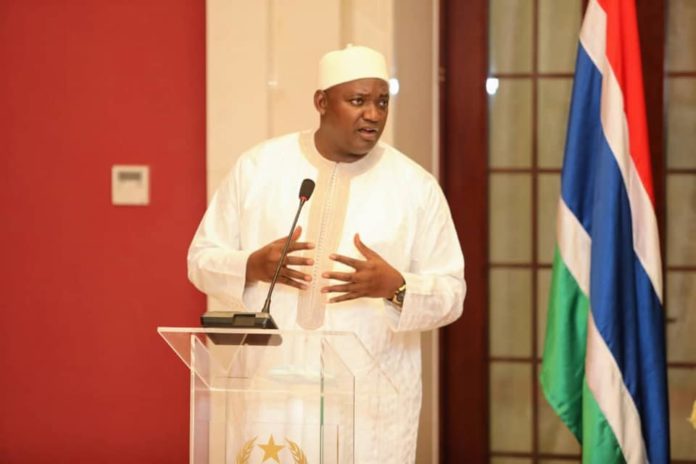In the current state of affairs, it seems that the President of the Republic of Gambia, His Excellency Adama Barrow, has taken the path of grandiloquence, as he advocates for the delivery of mandates by public institutions. However, a closer examination of the situation reveals that his assertions are shrouded in hyperbole and lack substantive evidence to back his claims. This op-ed serves as a harbinger of dissent, a beacon of reason that exposes the flaws in the President’s argument and presents a counter-narrative to the current discourse.
In recent times, there has been a growing trend of African leaders calling for the improvement of public institutions. The Gambian President, Adama Barrow, is one such leader who has made a similar call. While the intention behind such calls is commendable, the reality of the situation is far from simple. In this op-ed, I will be examining the flaws in President Barrow’s plan for state-owned enterprises (SOEs).
First, it is important to note that the problem of ineffectiveness in SOEs is not unique to The Gambia. This is a problem that has plagued African economies for decades. Despite the massive investments made by the government, many SOEs continue to post losses. As a result, it is not enough to simply call for the improvement of these institutions. A more comprehensive approach is needed.
Second, President Barrow’s plan relies heavily on performance contracts. The idea of performance contracts is not new and has been used in various countries with limited success. The reason for this is that performance contracts only work when the underlying issues that are causing poor performance are addressed. In The Gambia, it is not enough to simply sign performance contracts and hope for the best. The root causes of poor performance must be addressed, such as corruption and mismanagement, before performance contracts can have a significant impact.
Third, the focus on SOEs as a solution to the country’s problems is misguided. The Gambian economy is not primarily driven by SOEs. The majority of economic activity takes place in the private sector. By focusing too much on SOEs, the government risks neglecting the private sector, which is the primary engine of economic growth.
Fourth, President Barrow’s plan assumes that the government is capable of effectively overseeing SOEs. However, this is not always the case. In many African countries, the government has limited capacity to effectively regulate and supervise SOEs. This is due to a lack of resources and technical expertise. Without the necessary capacity, the government’s ability to ensure that SOEs are operating in an efficient and effective manner is limited.
Furthermore, the President’s plan lacks the consideration of external factors that can impact the success of the State-Owned Enterprises. For instance, the global economy, political instability, and fluctuations in commodity prices can have significant impacts on their performance. Ignoring these variables will only lead to unrealistic expectations and ultimately disappointment. It is imperative that the government takes a comprehensive approach, factoring in all relevant circumstances, before setting targets and expectations for the SOEs. Failing to do so would be like trying to row a boat upstream without considering the current of the river – a fruitless endeavour.
Finally, the focus on SOEs as a solution to the country’s problems is a form of government intervention that has been discredited in many countries. The experience of many countries, including The Gambia, has shown that government intervention in the economy often leads to inefficiencies, corruption, and mismanagement. This is because the government does not have the same incentives as the private sector. The private sector is driven by the desire for profit, while the government is driven by political considerations.
In conclusion, President Barrow’s plan for SOEs is well-intentioned, but it is flawed. The focus on SOEs as a solution to the country’s problems is misguided, and the reliance on performance contracts is unlikely to have a significant impact. A more comprehensive approach is needed, one that addresses the root causes of poor performance and recognizes the limitations of government intervention.








